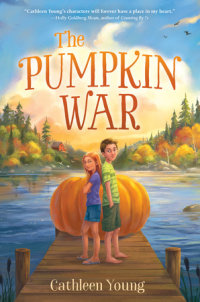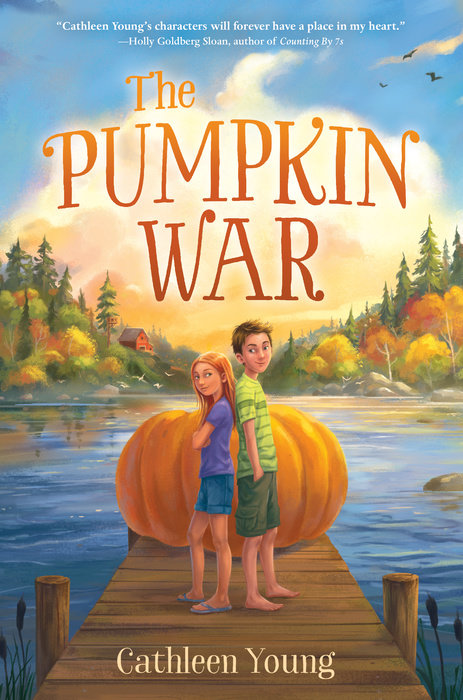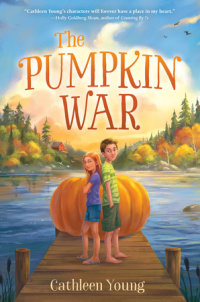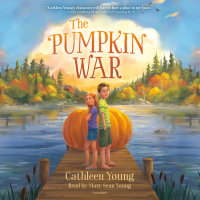The Pumpkin War
"Cathleen Young's characters will forever have a place in my heart." --Holly Goldberg Sloan, author of Counting by 7s
Former best friends compete to see who can grow the biggest pumpkin and win the annual giant pumpkin race on the lake. A great pick for fans of Half a Chance and Gertie's Leap to Greatness.
At the end of every summer, Madeline Island hosts its famous pumpkin race. All summer, adults and kids across the island grow giant, thousand-pound pumpkins, then hollow one out and paddle in it across the lake to the cheers of the entire town.
Twelve-year-old Billie loves to win; she has a bulletin board overflowing with first-prize ribbons. Her best friend Sam doesn't care much about winning, or at least Billie didn't think so until last summer's race, when his pumpkin crashed into hers as she was about to cross the finish line and he won. This summer, Billie is determined to get revenge by growing the best and biggest pumpkin and beating Sam in the race. It's a tricky science to grow pumpkins, since weather, bugs, and critters can wipe out a crop. Then a surprise visit from a long-lost relative shakes things up, and Billie begins to see her family, and her bond with Sam, in a new way.
An Excerpt fromThe Pumpkin War
I watched Sam through my binoculars as he planted his pumpkin seedlings. He looked like a two-legged bug I could squash with my thumb.
I climbed higher through a web of tangled branches and emerald-green leaves smeared with sunlight, my binoculars swinging from a braided lanyard around my neck.
My head popped into open sky.
I could see my whole world from up here. Our house looked like a wooden bird that had crashed into the hillside. My dad built it with his own hands before I was born. He says our house is “in harmony with nature.” I say it’s weird to have a closet hacked from brownstone and a tiny trickle of a stream cutting through the middle of our kitchen during the rainy season.
Up the hill from my house, at the end of a skinny dirt footpath, I spotted my beehives, a row of white wooden boxes stacked like suitcases.
I love my bees. They turn the world into a taste.
When I stick my finger into a fresh comb bursting with honey, I can taste the globe mallows that tickle my neck when my little sister and I lie sprawled on our backs behind the barn, eating sticky jelly beans from my secret stash, and I can smell the purple lupine that explodes across the fields around my house after a spring thunderstorm. I swear I can even feel the cool breeze hitting the brittlebush in the heat of summer.
Sam says that’s impossible, that it’s just my overactive imagination at work.
What does he know.
I could see my half-built tree house stuck in a towering pine tree and our gray barn slouched next to the feed shed. Our water tank looked like a fat red Tootsie Roll stuck in the middle of the meadow that rolls down from our farm to Chequamegon Bay.
Pronounced she-wah-me-gan.
The bay used to be called Zhaagawaamikong. It was named by the Ojibwe, who lived here first until we stole their land. I guess I shouldn’t say we, since I’m half Ojibwe from my mom’s side. My dad is Irish. When I look in the mirror, I see his red hair and green eyes.
The wind kicked up, and whitecaps skittered across the bay. I raised my binoculars and scanned the horizon until I spotted my dad’s fishing boat, her bow riding low with his haul of whitefish. He named his boat Niinimooshe for my mom, to honor her heritage. Niinimooshe means “sweetheart” in Ojibwe.
My mom thinks that’s romantic. If she spent as much time on that stinky boat as I did, she might not think so.
I swung my binoculars back toward land and found Sam, still planting his seedlings. All of a sudden he looked up and smiled in my direction. I ducked into the leaves as a prickly heat crawled up my neck and across my face.
Sam used to be my best friend, and he’d like to be my best friend again, but that’s never going to happen after what he did last summer.
That night, we had tofu for dinner. Even if you try to drown it in sesame sauce, it still tastes like tofu.
We used to eat meat. Teriyaki steak. Swedish meatballs. Polish sausage. Those were the good old days.
Marylee ruined everything a year ago when she turned five. That’s when my little sister put two and two together and realized the steak on her plate used to be alive.
Now she won’t touch meat. She won’t even look at it. And there’s no talking her into it. Believe me, we’ve all tried. It turns into a lot of yelling (my dad) and crying (my sister) and pleading (my mom) and more yelling (me), and by then no one wants to eat anything anyway.
So we eat a lot of tofu. Mom calls it a “perfect protein,” but if you go by taste, it’s far from perfect.
“The baby kept me up all night,” Mom said, shoveling chunks of buttery baked potato into her mouth.
“How?” Marylee asked. “He’s not even born yet.”
“He likes to kick.”
My mom was so big, she had to sit a mile back from the kitchen table and rest her plate on her belly.
“Can’t you make him stop?” Marylee asked.
“Baby’s the boss,” Mom sighed. “In a few more weeks, your new brother will be right here with us.”
While Mom stuffed a piece of not-so-perfect protein into her mouth, my sister dropped her broccoli on the floor and squished it through the heating vent under her chair. She might be a vegetarian, but even she has her limits.
“Good news, Billie,” my dad said, his elbows resting on the edge of the kitchen table, which was a slab of granite that grew out of the floor like a giant mushroom with a shaved top. “You can plant your pumpkin seedlings tomorrow.”
I stared at him. “What about the frost warning?”
“False alarm,” he said with a shrug.
“You could’ve told me,” I grumbled.
“I just did.”
“She’s just mad because Sam got his seedlings in before her,” Marylee piped up, sucking on a green bean like it was a straw.
Almost every kid on Madeline Island grows a giant pumpkin to compete in the annual Madeline Island Pumpkin Race. You start your seedlings in the spring and the pumpkins grow big and round over the summer. In the fall you hack off the top of your biggest one, scrape out the slimy guts, line it with itchy burlap, haul the hollowed-out pumpkin down to the lake, jump inside, and race it across the bay using a kayak paddle.
Last year, just as I was about to blast across the finish line, Sam sideswiped my pumpkin, breaking it into raggedy chunks.
When he threw a look over his shoulder and saw me bobbing in the water, he looked guilty.
He’d cheated, and he knew it. It’s against the rules to ram another racer’s pumpkin.
Afterward, he flat-out denied it. He said my pumpkin cratered because of all the rain that spring, that my pumpkin was too waterlogged to hold together.
The judges hadn’t seen what happened, so it was his word against mine.
That was bad enough, but then I kept losing to him all through sixth grade.
At the all-school spelling bee, I got hubris wrong and he got escarpment right. Then, at the science fair, Ms. Bagshaw was very impressed with his acid test to tell minerals apart and not so impressed with my comparison of the different respiration rates in goldfish versus humans.
“I’m gonna win the race this year,” I declared.
My mom looked up from her plate.
“Life isn’t about winning, Billie.”
I didn’t say anything. Because it is about winning, and everyone knows it. Even grown-ups know that.
That’s why they don’t cheer when you lose.



